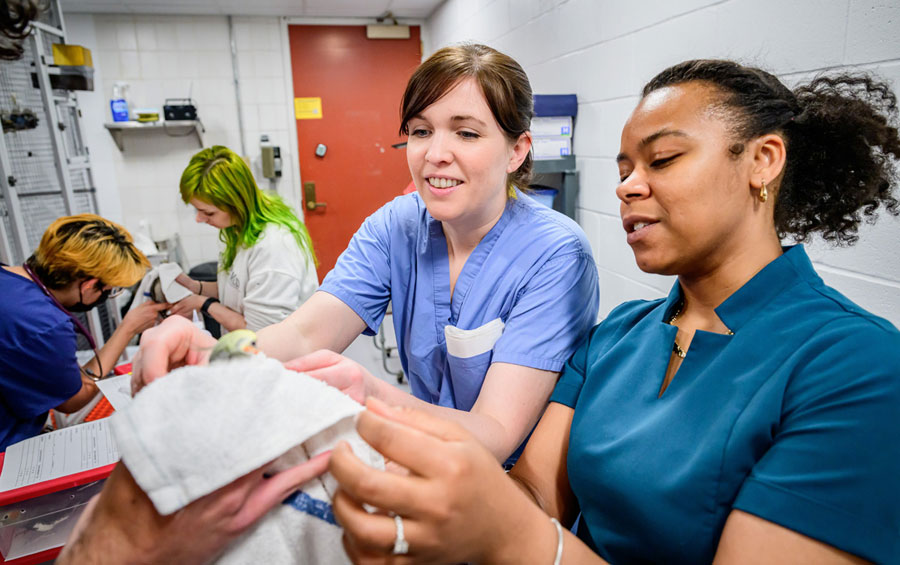This message will appear in the August/September 2020 issue of the Chicago Veterinary Medical Association Bulletin.
College Aids Plans for Safe Return to Campus
As veterinarians, each of us took a solemn oath to use our knowledge and skills to benefit society and promote public health. The COVID-19 outbreak presents a public health crisis on a scale unprecedented in our lifetimes. Veterinarians from all realms of practice have responded to this challenge in remarkable ways.
I am especially proud of our students and faculty for the way they have rapidly adapted to delivering excellence in teaching, research, and veterinary services in this era of remote interactions and heightened biosecurity. There are many heroic stories to tell.
Our anesthesia service head organized a statewide registry of veterinarians with respiratory expertise and respirators that could be diverted for human use. Our ER service assisted in the development—in just one week—of the Illinois RapidVent emergency ventilator prototype that performs as well as commercially available ventilators and is now in mass production to prevent shortages. ER also arranged to include Illinois veterinary students, who had been sent off campus, in daily small-group rounds via Zoom to provide continuity of education.
They accomplished all that in March. And those are just a few examples of efforts, among all the work done by the faculty and staff at our college, to illustrate the veterinary factor in this pandemic response.
Another story has been unfolding on the Urbana campus over the summer in preparation for the fall semester. The stakes are high, the effort extraordinary, and the breadth of disciplines diverse.
![[person giving saliva sample]](https://vetmed.illinois.edu/wp-content/uploads/2021/04/dean-covid2.jpg)
Plan Devised by Brilliant Minds at Illinois
In mid-May, Chancellor Robert Jones commissioned more than 150 faculty and staff members to serve on seven committees to develop plans for the safe return to on-campus operations. The largest of these committees, called the “SHIELD: Target, Test, Tell” working team, has 34 team members, including three faculty members from the College of Veterinary Medicine.
Dr. Tim Fan, oncology specialist and cancer researcher, was appointed to serve as diagnostics operations manager for the team. Dr. Becky Smith, veterinary epidemiologist and statistician, is contributing her expertise in disease transmission modeling. Dr. Leyi Wang, head of the virology section in our Veterinary Diagnostic Laboratory, has overseen the development of a rapid testing protocol that is now in use. (By the way, whenever Dr. Wang is mentioned by campus leaders these days, he is described as the person who “literally wrote the book on coronaviruses,” referring to his 2016 218-page tome entitled Animal Coronaviruses.)
Dr. Robin Holland, who completed her DVM at our college this spring through our Veterinary Medicine Scholars Program (she earned her PhD in 2017), was another key player in the testing effort. She was one of four graduate student researchers assigned to develop a COVID-19 testing protocol that was saliva-based and could be scaled to deliver 10,000 test results in a single day. Those tests are being processed in our veterinary diagnostic laboratory in a suite of rooms newly dedicated to this function.
Testing Operational within Two Months
On July 8, the chancellor announced that walk-up testing sites using the saliva protocol were available to students, faculty, and staff who wish to be tested. To allow for the safe return to on-site operations, COVID testing will need to be performed repeatedly, based on individuals’ risk level, and a secure app will alert those who may have come into contact with an infected person.
The COVID-19 pandemic has proven a formidable foe. Many uncertainties lie ahead. But I am certain that there is no better plan for protecting the health and well-being of a fully functioning campus community than the one developed by the brilliant minds at the University of Illinois.
And I am so proud of the role that veterinary experts are playing in our efforts to return to on-campus operations.

![[placing a tube with a saliva sample into a holder]](https://vetmed.illinois.edu/wp-content/uploads/2021/04/dean-covid-testing.jpg)


